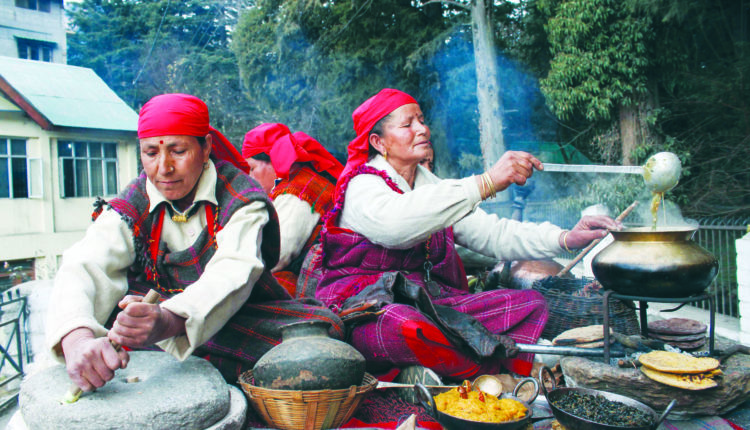Can Food Tourism Help Regenerate Our Planet?

Artists from Himachal prepare traditional food during the five-day-long national level Winter Carnival festival, the largest tourism event of Himachal Pradesh in Manali on Jan 2, 2022 (PTI)
The coronavirus pandemic showed us we were on the wrong track to developing sustainable tourism. Reduced mobility and border closures brought the world to a stop, pushing many to think about the present and future of tourism.
The visitor economy can rely on regenerative tourism to ensure it’s resilient to future crises. Regenerative tourism creates a meaningful balance between local culture, natural ecosystems, hosts and guests. It aims to improve the community holistically, rather than minimising the impact of tourism. The idea is to leave the place better than you found it.
Food plays a major role in this. Every destination has a distinct culinary heritage behind unique gastronomic experiences. Food tourism allows travellers to discover a place through their cuisines while building meaningful connections and a deeper understanding of local culture.
As tourism is shaped by the values of the people who work in it, a conscious supply of these elements will lead to a conscious demand. New Zealand has largely promoted regenerative tourism based on indigenous values focused on the Tiaki Promise, where both locals and visitors are urged “to act as a guardian, protecting and preserving our home”. For example, local tour groups like The Seventh Generation, develop experiences based on the Maori principles of respect for culture and nature. If businesses are committed to the environment, visitors will also build lasting ties to the destination by learning from local practices.
There are few places in the world that almost wholly focus on food-based regenerative tourism. Furanchos, for example, are private homes in Galicia, Spain, used as food establishments for only three months a year. It began with the idea of sharing local wine and food with friends, family and visitors. Agricultural activity remains the central element of the local economy but the furanchos are where winemakers sell surplus artisanal wine and traditional dishes. Strict legal regulations only allow it to open and serve a limited number of dishes, making it naturally sustainable.
Farm-to-table eating experiences are an important element in regenerative tourism. Relying on local resources contributes to the local economy and fosters shorter supply chains — helping local farmers, growers and fishermen instead of relying on large industries. It significantly reduces the amount of waste and contributes to less greenhouse gases.
Regenerative food tourism experiences engage people with local cultures, for example, by learning how to cook indigenous recipes, and with nature, including picking their own ingredients from a forest. Many restaurants, such as Les Cols, look to nature as the source of culinary inspiration with menus that are seasonal and locations that are culturally significant.
Climate change has impacted local agriculture and diets. We can adapt better by consuming seasonal local products. Local chefs play a significant role in this shift from a reliance on imported goods. Ecuadorian chef Rodrigo Pacheco’s forest-based restaurant, for example, aims to increase awareness of the biodiversity of the local environment.
Gastronomic tourism can be limited. It can be inaccessible due to being in a remote area, or expensive, such as a luxury Michelin-starred restaurant. But there are a wide range of food experiences where each of us can contribute to the foundations of regenerative tourism. Buying at a farmers’ market or tasting street food can also result in tangible (economic and environmental) and intangible (cultural and social) impacts. The development of sustainable food production and consumption all contribute to regenerative tourism and our planet’s future.
Food plays a pivotal role in destination management and marketing, and as part of people’s travel decisions. After all, food remains at the core of humanity’s identity and survival, so it’s time more tourism destinations catch up with this notion.
(Originally published under Creative Commons by 360info™)





